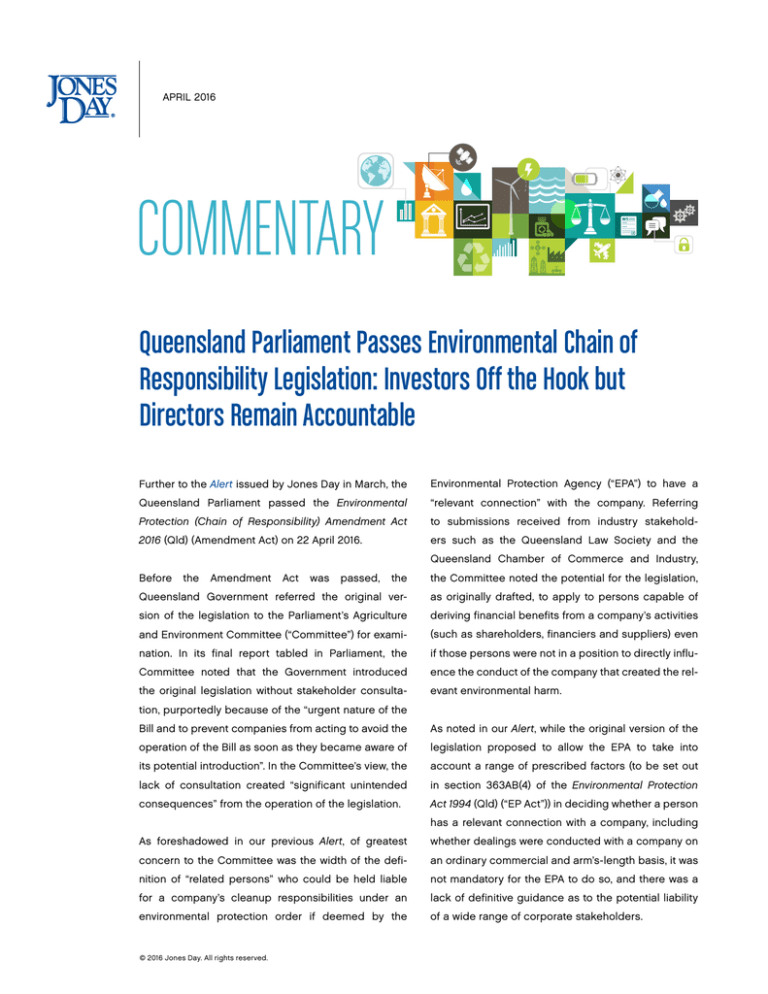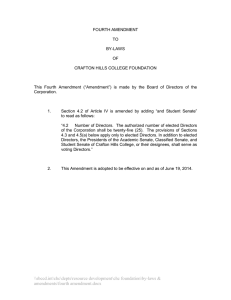
April 2016
COMMENTARY
Queensland Parliament Passes Environmental Chain of
Responsibility Legislation: Investors Off the Hook but
Directors Remain Accountable
Further to the Alert issued by Jones Day in March, the
Environmental Protection Agency (“EPA”) to have a
Queensland Parliament passed the Environmental
“relevant connection” with the company. Referring
Protection (Chain of Responsibility) Amendment Act
to submissions received from industry stakehold-
2016 (Qld) (Amendment Act) on 22 April 2016.
ers such as the Queensland Law Society and the
Queensland Chamber of Commerce and Industry,
the
the Committee noted the potential for the legislation,
Queensland Government referred the original ver-
as originally drafted, to apply to persons capable of
sion of the legislation to the Parliament’s Agriculture
deriving financial benefits from a company’s activities
and Environment Committee (“Committee”) for exami-
(such as shareholders, financiers and suppliers) even
nation. In its final report tabled in Parliament, the
if those persons were not in a position to directly influ-
Committee noted that the Government introduced
ence the conduct of the company that created the rel-
the original legislation without stakeholder consulta-
evant environmental harm.
Before
the
Amendment
Act
was
passed,
tion, purportedly because of the “urgent nature of the
Bill and to prevent companies from acting to avoid the
As noted in our Alert, while the original version of the
operation of the Bill as soon as they became aware of
legislation proposed to allow the EPA to take into
its potential introduction”. In the Committee’s view, the
account a range of prescribed factors (to be set out
lack of consultation created “significant unintended
in section 363AB(4) of the Environmental Protection
consequences” from the operation of the legislation.
Act 1994 (Qld) (“EP Act”)) in deciding whether a person
has a relevant connection with a company, including
As foreshadowed in our previous Alert, of greatest
whether dealings were conducted with a company on
concern to the Committee was the width of the defi-
an ordinary commercial and arm’s-length basis, it was
nition of “related persons” who could be held liable
not mandatory for the EPA to do so, and there was a
for a company’s cleanup responsibilities under an
lack of definitive guidance as to the potential liability
environmental protection order if deemed by the
of a wide range of corporate stakeholders.
© 2016 Jones Day. All rights reserved.
If passed in its original form, the legislation may have had
While the Amendment Act as passed therefore addresses
a significant adverse impact on investment in Queensland’s
concerns about adverse repercussions on investment in
already struggling mining and resources sector.
the energy and resources sector in Queensland, it remains
the case that directors will almost certainly face the pros-
In its report, the Committee also viewed as inequitable pro-
pect of personal liability under the Amendment Act (in the
visions of the original legislation that automatically deemed
form of remediation costs and/or criminal liability) for the
land owners to be “related persons” who could be made lia-
environmental cleanup obligations of a company, regardless
ble for a company’s environmental cleanup bill even if they
of whether they have acted responsibly, in good faith and
had no influence or control over the activities conducted by
in accordance with evidence-based decisions with respect
the company on the land.
to environmental management issues. Despite strong objections raised by stakeholders, including the Australian Institute
Under the Amendment Act as passed, land owners are no lon-
of Company Directors, the Government chose not to limit
ger automatically considered to be related persons. This is a
the prospective liability of directors under the Amendment
welcome development and means that farmers, graziers, native
Act. The Government also chose not to introduce a statu-
title parties and others with an ownership interest in freehold
tory defence excusing directors from liability if they were in a
land will not be personally responsible for rectifying environ-
position to influence the conduct of the company that gave
mental damage caused by a company undertaking activities
rise to the relevant environmental obligation or liability but
on the land absent any influence or control over those activities.
nevertheless took all reasonable steps to ensure the company’s compliance with the EP Act.
Additionally, a person can now be found to have a relevant
connection with a company that has caused environmental
The liability faced by directors under the Amendment Act
harm only if the person is (or was at any time in the previous
appears to be inconsistent with the Council of Australian
two years) in a position to influence the company’s compli-
Governments’
ance with the EP Act or is otherwise capable of significantly
Guidelines, under which all Commonwealth, State and
benefiting financially from the company’s activities (the legis-
Territory Governments agreed to minimise the regulatory
lation as originally drafted excluded the word “significantly”).
burden on directors and to ensure that any liability provisions
While it is still not mandatory for the EPA to consider the pre-
are drafted “to achieve a result that is equitable and does not
scribed factors in section 363AB(4) of the EP Act in assessing
impose any unfair burden” on directors.
Personal
Liability
for
Corporate
Fault
whether a relevant connection exists, the EPA is now required
to develop and take into account express statutory guide-
The potential for directors to incur civil and criminal liability as
lines designed to control the exercise of the EPA’s discretion.
a result of the imposition of an environmental protection order
under the Amendment Act, even if they have not acted dishon-
This amendment has the potential to provide certainty to corpo-
estly or improperly, does not strike a fair and equitable balance
rate stakeholders with respect to their environmental cleanup
between the protection of the environment in the public interest
obligations. While the precise terms of the statutory guidelines
and the reasonable expectations of honest, diligent directors.
have not yet been finalised, the Government has indicated
that, in contrast to the hasty introduction of the original leg-
While it is possible the statutory guidelines, when drafted,
islation, it will consult widely with stakeholders to ensure the
may reduce directors’ environmental responsibilities, that
intended objectives of the Amendment Act are achieved. The
appears unlikely in light of the EPA’s view, noted in the
Government intends to make it clear that third parties will not
Committee’s report, that the risk of environmental harm is “of
face personal liability for a company’s environmental cleanup
significant public concern and considered to be a compel-
obligations if they were not in a position to influence or con-
ling policy justification for imposing liability on directors who
trol the company’s activities and they derived financial benefits
have the ability to influence a company’s environmental con-
only from ordinary arm’s-length transactions with the company,
duct or who have benefited financially from carrying out an
such as financing arrangements and share transactions.
environmentally relevant activity”.
2
Jones Day Commentary
As a result, the Amendment Act may create significant disincentives to the uptake of directorships and management
Lawyer Contacts
positions in the energy and resources sector in Queensland.
For further information, please contact your principal Firm
As noted by the Queensland Law Society in its submission to
representative or one of the lawyers listed below. General
the Committee, “[t]his will be to the significant detriment of
email messages may be sent using our “Contact Us” form,
not only business development but decision making in these
which can be found at www.jonesday.com/contactus/.
industries around governance and risk management, including the monitoring of compliance”.
Brett Heading
Brisbane
If the Amendment Act is enforced strictly as written, it will be
+61.2.8272.0521
important for directors, managers and all related parties of
bheading@jonesday.com
an entity that is liable for environmental rehabilitation to do
what they can to ensure the entity has sufficient funds to pay
Tony Wassaf
full rehabilitation costs in all scenarios. This will include carry-
Sydney
ing provisions for rehabilitation liability that are:
+61.2.8272.0527
twassaf@jonesday.com
•
•
•
Based on worst-case technical evaluation and assumptions as to the necessary rehabilitation;
James Parker
Based on worst-case economic assumptions as to life of
Sydney
the facility; and
+61.2.8272.0777
Not discounted based on expected timing of costs.
jimparker@jonesday.com
Even then, these steps may not provide full protection from
Kai Luck
personal liability for related parties.
Brisbane
+61.2.8272.0502
kluck@jonesday.com
Jones Day publications should not be construed as legal advice on any specific facts or circumstances. The contents are intended for general information purposes only and may not be quoted or referred to in any other publication or proceeding without the prior written consent of the Firm, to be
given or withheld at our discretion. To request reprint permission for any of our publications, please use our “Contact Us” form, which can be found
on our website at www.jonesday.com. The mailing of this publication is not intended to create, and receipt of it does not constitute, an attorney-client
relationship. The views set forth herein are the personal views of the authors and do not necessarily reflect those of the Firm.



